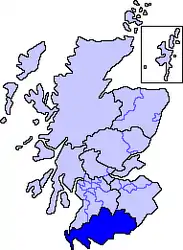Dumfries and Galloway Constabulary
Dumfries and Galloway Constabulary was the territorial police force responsible for Dumfries and Galloway, Scotland until 1 April 2013.
| Dumfries and Galloway Constabulary | |
|---|---|
| Motto | Semper Vigilo |
| Agency overview | |
| Formed | 1948 (merger) |
| Dissolved | 2013 |
| Superseding agency | Police Scotland |
| Jurisdictional structure | |
| Operations jurisdiction | Dumfries and Galloway, Scotland |
 | |
| Map of Dumfries and Galloway Constabulary's jurisdiction. | |
| Size | 6,426 km² |
| Population | 148,000 |
| Operational structure | |
| Headquarters | Dumfries |
| Sworn members | 508 + 106 Special Constables |
| Agency executive |
|
| Divisions | 2 |
| Facilities | |
| Stations | 19 |
The police force was formed in 1948 as an amalgamation of the police forces of Dumfriesshire, Kirkcudbrightshire, and Wigtownshire, and preceded the creation of the former Dumfries and Galloway Regional Council by 27 years.[1]
The last Chief Constable was Patrick Shearer QPM. Shearer was appointed on 24 April 2007,[2] in succession to his predecessor David Strang who was made Chief Constable of Lothian and Borders Police.[3] The Deputy Chief Constable was George Graham, who took over from Robert Ovens QPM on 1 January 2006.[4]
An Act of the Scottish Parliament, the Police and Fire Reform (Scotland) Act 2012, created a single Police Service of Scotland – known as Police Scotland – on 1 April 2013.[5] This merged the eight regional police forces in Scotland, together with the Scottish Crime and Drug Enforcement Agency, into a single service covering the whole of Scotland.[6] Police Scotland's interim headquarters is at the Scottish Police College at Tulliallan in Fife.
Lockerbie bombing
On 21 December 1988 Pan Am Flight 103 exploded mid-air as a result of a bomb on board, and the wreckage crashed in the town of Lockerbie, within the police area of Dumfries and Galloway Constabulary. In the UK, the event is referred to as the "Lockerbie air disaster", the "Lockerbie bombing", or simply "Lockerbie". Eleven townspeople were killed in Sherwood Crescent, where the plane's wings and fuel tanks plummeted in a fiery explosion, leaving a huge crater. The 270 fatalities (259 on the plane, 11 in Lockerbie) included citizens of 21 nations.
The subsequent police investigation, led by Dumfries and Galloway Constabulary, was the largest ever mounted in Scottish history and became a murder inquiry when evidence of a bomb was found. Two men accused of being Libyan intelligence agents were eventually charged in 1991 with planting the bomb. It took a further nine years to bring the accused to trial. Abdelbaset al-Megrahi was jailed for life in January 2001 following an 84-day trial, which was held at Camp Zeist in the Netherlands, but under Scottish law.[7] On 20 August 2009, al-Megrahi was freed on humanitarian grounds because of an apparent terminal prostate cancer.[8]
Chief Constables
- 1948–1965 – Sydney Arthur Berry
- 1965–1984 – Alexander Campbell
- 1984–1989 – John Boyd
- 1989–1994 – George Esson
- 1994–1996 – Roy Cameron (afterwards Chief Constable of Lothian and Borders, 1996–2002)
- 1996–2001 – William Rae
- 2001–2007 – David Strang
- 2007–2013 – Patrick Shearer[9]
References
- "Our History". Dumfries and Galloway Constabulary. Archived from the original on 19 August 2003. Retrieved 3 April 2011.
- "Profile – Chief Constable". Dumfries and Galloway Constabulary. Archived from the original on 20 December 2010. Retrieved 3 April 2011.
- "Chief Constable David Strang". Lothian and Borders Police. Archived from the original on 31 December 2010. Retrieved 3 April 2011.
- "Profile – Deputy Chief Constable". Dumfries and Galloway Constabulary. Archived from the original on 20 December 2010. Retrieved 3 April 2011.
- STV News, 30 October 2012
- "Police and fire service merger 'would save £1.7bn'". stv.tv. 17 January 2012. Retrieved 19 January 2012.
- "Libyan guilty of Lockerbie bombing". BBC News. 31 January 2001. Retrieved 3 April 2011.
- "Lockerbie bomber freed from jail". BBC News. 20 August 2009. Retrieved 3 April 2011.
- Giancarlo Rinaldi, "The biggest cases of Scotland's smallest police force", BBC News, 1 April 2013, Retrieved 1 April 2013